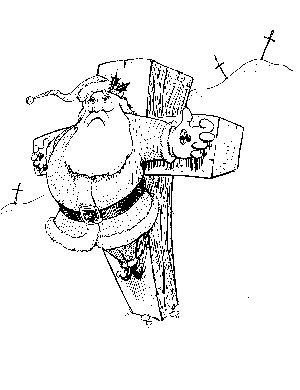
This person would be Judge, King and High Priest, all at the same time. Since all those positions were marked by annointing the recipient with oil, this reincarnated Joshua would be called the mashiach or messias (depending on dialect), both words meaning simply "annointed with oil."
Judas Maccabeus was hailed as messias in his day, and parleyed the title into a new Jewish dynasty.
The modern translation of messias, of course, is "messiah."
When the Maccabean dynasty failed to bring lasting freedom from oppression, the Jewish people began looking for a new Messiah, or annointed one.
At the time of Jesus, there were already two messiahs in the nation. King Herod (who had been annointed by oil at his coronation) was a "messiah." And Caiaphas, the high priest, was also considered a messiah for he also had been annointed with oil at his installation.
When Jesus claimed, therefore, to be a messiah, it was indeed heresy. This was the equivalent today of someone claiming to be President of the U.S. and High Pontiff of the Roman Catholic Church, at the same time! (And without an election.)
Those people who followed the teachings of Jesus, after his death, were called variously "Nazarians" (the "holy" people) and "Messianists" (followers of the annointed one).
They believed Jesus to be the reincarnated spirit of Joshua, who would yet return from the dead to lead the Jews to freedom from Roman oppression. "Jesus" is simply the transliteration into English of the Greek word Iesus, which was a transliteration of the Aramaic word Yeshua, which was identical to the word "Joshua" in modern English. Jesus was Joshua.
These ideas were popular among those Jews who lived throughout the Roman Empire, facing discrimination and even persecution from the government of Rome.
But the language of the world outside Palestine was not Hebrew. In most areas of the known world, the language was Greek, a holdover from Alexander the Great's conquering the Middle East and Africa.
And there is no Greek word that is any way a cognate of the Hebrew messias. There was no one word that would denote: annointing with oil, a spiritual or a political leader, a human being and (possibly) a reincarnation of Joshua.
There was a Greek word that meant "annointed with oil," however. Based on the Greek root chrisma, meaning "oil," it was the word Christos. But it was never used to describe a human being -- only a god.
A Christos was used exclusively to describe Priapic deities, that is, statues of gods with long phalluses!
These deities were presumed to be aids to fertility, so women who wanted to guarantee fertility would often mount the wooden statues. Because the phalluses were quite large, and of coarse material, they were usually lubricated first ("annointed") with oil.
Such a statue was a Christos.
Thus, a minor Jewish cult following a human being named Jesus became quite a different thing when Jesus' title was translated into Greek. From a mere human being, he became a god.
Such a concept was extreme heresy, of course, to Jews, so most of them quickly left the new religion, leaving Christianity to the goyim.
The word "Christ" was originally simply any Priapic god in the Greco-Roman pantheon.
In Mithraism, only men could be priests, worship was on Sunday (for Mithras was the sun god), and Mithras was known by the titles "Lord" and "Savior."
Mithras was portrayed as a God who came to earth to redeem humans, who wandered the world with his 12 disciples (the 12 signs of the Zodiac) and who died for the sins of humanity.
Any of this sound familiar?
The primary religious service of the Mithraists was a ceremonial dinner at which a bull was killed. At the dinner, called a mizd (after the Persion word mazda meaning "god), participants drank the blood of the bull and ate the meat -- claiming these had become the actual body and blood of the god.
Later (or whenever slaughtering a bull wasn't possible), the ritual was changed to substitute wine for the blood and bread for the meat.
The Latin word for this mizd was missa, or today's Mass.
When the Emperor Constantine adopted Christianity as the State religion, he also required it to incorporate many of the Mithraic elements -- male priesthood, Sunday worship, and celebration of the mass.
So a "mass" is a ritual meal at which the body and blood of the sacrificed god is eaten.
The real meaning of the word "Christmas"?
It's a meal at which the body and blood of a Priapic, oiled god is eaten.
Yccch!